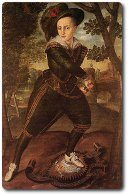The White Devil Contents
- Social / political context of The White Devil
- Religious / philosophical context of The White Devil
- The Theatre
Giovanni
As with most children in Elizabethan and Jacobean tragedies, Giovanni represents purity and innocence, and demonstrates the suffering that the machinations of evil people cause in others.
Hope for the future
Giovanni is the son of Brachiano and Isabella and so is caught in the middle of their quarrel at the beginning of the play. Isabella's brother, Francisco de Medici, uses Giovanni to try to make peace between the estranged couple:
What hopes you store in him; this is a casket
For both your crowns, and should like be held dear.' (Act 2 scene 1)
Precocious prince
Judged by his appearance in Act 2 scene 1, Giovanni seems to be very opinionated and ready to speak his mind. He lectures his uncle, Francisco, on the correct way to conduct a war. He also shows that he is able  to engage in argument with adults. He is clearly indulged by the surrounding adults because of his youth and the fact that he embodies the hopes of his family. Francisco calls him ‘Witty prince'.
to engage in argument with adults. He is clearly indulged by the surrounding adults because of his youth and the fact that he embodies the hopes of his family. Francisco calls him ‘Witty prince'.
Giovanni may be a reflection of James I's eldest son, Henry Frederick, Prince of Wales. Although he died aged only 18, he was a popular, athletic, witty and accomplished young man who showed great promise. Like Giovanni he also had upright religious views and was interested in military affairs and how the nation should be ruled.
Giovanni's relationship with his mother
In Act 3 scene 2 Giovanni returns to Rome with Lodovico to announce his mother's death. His description of her displays the grief and the confusion of a young boy:
I have not slept these six nights. When do they wake?'
Giovanni explains the closeness he has with his mother when he says how she breast-fed him. This would have been very unusual for a noble-woman of the time (who would have handed over their children to a ‘wet nurse' for breast-feeding):
And it should seem by that she dearly loved me,
Since princes seldom do it.'
Giovanni as ruler
After his father, Brachiano, is murdered in Act 5, Giovanni inherits his title. He is portrayed as more mature, although we have not been told how much time has passed. In Act 5 scene 4 Giovanni is praised by Gasparo, but Flamineo is not impressed by him. Giovanni signals a change in the court by banishing Flamineo, who had been his father's closest attendant.
At the end of the play, Giovanni intervenes to put an end to the conspiracies and murders. He refuses to accept Lodovico's claim that he was doing the work of Francisco.
He gives the last speech of the play and ends with the rhyming couplet, which implies that the guilty will not get away with it:
Do lean on crutches, made of slender reeds.'
(Act 5 scene 6)
Such a proclamation re-enforces the idea represented from Giovanni's first appearance, that he is the hope for the future. He embodies a break from the bloodthirsty past of his relatives, although there might be some unease at the implication that his uncle Francisco may not be punished for his crimes.
